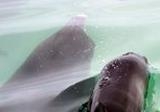Dolphins value good friends
Having good friends and relatives isn't only valued by humans. In dolphin "families", positive social interactions are more than twice as important as genes in determining successful reproduction, new research shows.
Having good friends and relatives isn't only valued by humans. In dolphin "families", positive social interactions are more than twice as important as genes in determining successful reproduction, new research shows.

In dolphin "families", positive social interactions are more than twice as important as good genes in determining successful reproduction, Associate Professor Bill Sherwin, from UNSW's Evolution and Ecology Research Centre, writes in Australasian Science.
Researchers have known for a long time that dolphins associate in something like human "mums' clubs". How important is this for successful reproduction compared with the importance of having good genes?
It turns out that both of them matter, but most notably we have found that the females who have successful relatives and successful "friends" are much better at producing calves than we would have expected from simply adding the effects of the relatives and the effects of their peer group.
This is the first discovery of interacting genetic and social effects on reproduction in the wild, and it may help us to understand whether our own behaviour and reproduction are driven by the same factors as other species.
Read a version of the feature story in the Faculty of Science Newsroom.
Media contact: Bob Beale, Faculty of Science media manager | 0411 705 435 |